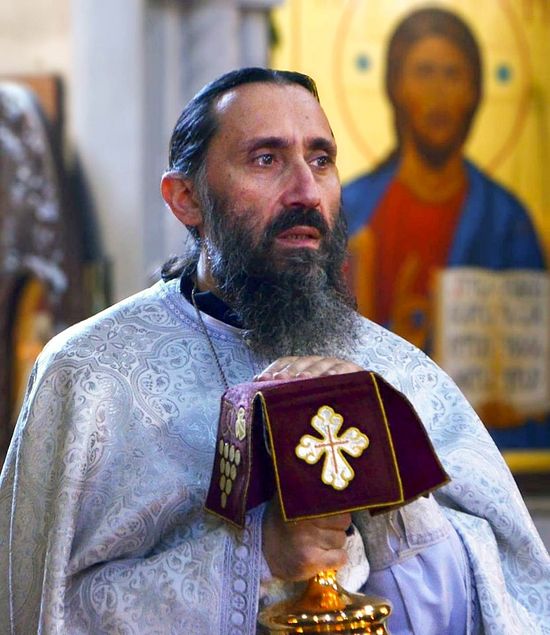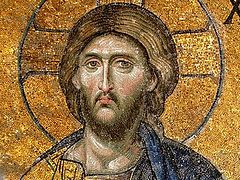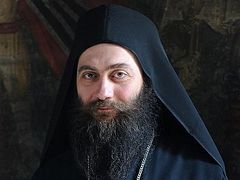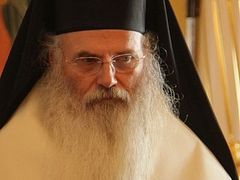In the typical Tbilisi residential area of Saburalo, on Panaskerteli Street, among the standard residential buildings stands a recently-erected church in honor of the Exaltation of the Cross of the Lord. The church was built in the traditional Georgian style and, of course, contrasts with the surrounding examples of Soviet domestic architecture.
In the same way, the call of this church’s rector to an active spiritual life, to the desire for Christ, as a recurring leitmotif in his sermons and public speeches, contrasts with the hustle and bustle of the surrounding city. The rector is Archpriest Theodore Gignadze, known for his inspired sermons that encourage people to practice the Jesus Prayer in their daily lives. Fr. Theodore refers to the experience and testimony of the fathers of the Church who claimed that there is nothing unusual or impossible for absolutely any Christian in this practice, that it is not at all necessary to be a monk in order to strive towards union with Christ, to which everyone baptized in the name of the Holy Trinity is called, and that one of the main paths to achieving this is this brief prayer.
The liturgical practice in Fr. Theodore’s church is interesting, introducing all worshipers to the Jesus Prayer: The usual services, according to the Typikon, are partially replaced by this prayer. For example, instead of daily Vespers, the parishioners would read the Jesus Prayer aloud on their prayer ropes, with Batiushka’s blessing, led by a priest or clergyman. Now, after the All-Night Vigil, Fr. Theodore himself recites the short prayer aloud instead of the First Hour, standing in the dimness of the evening church in front of the closed Royal Doors, inviting those praying to come to the ancient and soul-saving practice of the Jesus Prayer.
Before the evening service, the parishioners gather early, preparing themselves with the Jesus Prayer to receive the holy Mysteries of Christ.
We spoke with Fr. Theodore about the spiritual life of an Orthodox Christian in the realities of the modern world.
—Nearly 2,000 years have passed since the beginning of Christianity. The times and eras change, but the Church remains steadfast against the gates of hell, in the words of the Savior. Fr. Theodore, what has changed for the faithful over time? Should modern realities bring any adjustments to the spiritual life of a Christian?
—For the faithful, in essence, nothing has changed: The spirit of the world is still fighting with Christ and, accordingly, with His holy Church—from within and without. People are born, they grow, and they die just the same as in past centuries. Today, just as in the past, no one can prove the existence or non-existence of God, because He is outside of time, outside of space, outside the whole created world, and, accordingly, outside the natural sciences and logic. Faith is still a gift today, and no kind of technological process can change any of this, including the fact that faith is a gift.
Christianity is still incomprehensible to those who, though in the bosom of the Church, gratify only their own religious feelings and are busy fulfilling only the external law while rejecting the freedom granted by the incarnate Son of God and preached by the apostle Paul. Christianity is still realized in personal unity with Jesus Christ, when we, tired and burdened by the search for God and from not being filled with the inner content of religiosity, find peace in Him. Personal unity with Christ is still hampered by the passions of voluptuousness, acquisitiveness, and vanity, inherited from our ancestors. And the kenosis of God, that is, His extreme humility, His coming into the world, and His sufferings, crucifixion, and death, is still incomprehensible and inaccessible today. And, as always, so today it is difficult to see in the man Jesus the Creator of the universe, to become His loyal disciple, and to emulate and become like Him. The only thing that distinguishes us from ancient Christians is the language of our mission, as the people of every era have to speak in a language they understand. That is, changes are needed not in the spiritual life, but in our missionary language.
—What challenges does an Orthodox Christian face today, and how should we respond to these challenges?
—One of the main problems for modern believers is the lack of hesychastic practice.
In our time, in the thinking of people who are interested in spiritual and theological questions, there is a certain turmoil, based on the fact that fascination with theological topics is not supported by practice. This brings great harm to the Orthodox Church. Metropolitan Hierotheos (Vlachos) touches on this topic interestingly:
The sad and even tragic reality of our time is that many people speak about the deification of man (that is, about true Orthodoxy—Fr. Theodore) while not speaking of the ways and methods of achieving this goal. This is a fundamental mistake. For, as in all sciences, if there is no method, there will be no results… When theology doesn’t indicate the way and the method, that is, the ascetical-mystical method, it can never lead a person to the ultimate goal. Such theology is dangerous.1
And in some cases, we find a weakening of the Eucharistic life. We mustn’t forget that, as St. Nicholas Cabasilas teaches us, the Church is the Eucharist and the Eucharist is the Church.
That is, if a person doesn’t live Eucharistically, meaning communing often, he is not called a Christian. We are in the Church only for the sake of Christ, and the misunderstanding of this is an ecclesiological problem, which is one of the main challenges for Orthodox Christians. We see the negative consequences of this state of affairs in today’s universal Church.
—What is lacking for the modern average Orthodox, and what will help compensate for these shortcomings?
—We don’t have enough understanding and experience of the fact that on earth and in the life of every one of us there is only one treasure—Jesus Christ, the incarnate Son of God, without Whom no one could come to the Heavenly Father as a son. Everything else has value only so far as it is related to Christ.
—What is the most necessary characteristic for a Christian? What should help a Christian keep the right mindset, the right state of soul?
—The most important, or rather, the only characteristic of a Christian is conforming to Christ—learning from Him (cf. Mt. 11:29) to become like Him. Being in the right spiritual state is not a psychological disposition achieved through the will. From a Christian point of view, the right disposition only comes by grace, and grace is acquired by the Eucharistic life and proper prayer.
—The Church offers us two main paths for salvation: family life and monasticism. How can we make the right choice? How can we understand what is the right path for us?
—The Church offers us only one path: Come unto Me, all ye that labour and are heavy laden, and I will give you rest. Take My yoke upon you, and learn of Me; for I am meek and lowly in heart: and ye shall find rest unto your souls (Mt. 11:28-29). That is, the path is Christ Himself (cf. Jn. 14:6), and all the rest—our path in life, the right choice, wisdom and understanding for implementing the right choice, awareness of your talents and their realization—is given to us from the Lord: But seek ye first the Kingdom of God, and His righteousness; and all these things shall be added unto you (Mt. 6:33).
—How can we not make a mistake in choosing our partner in life? Which criteria are important and which are secondary?
—We’re never immune to mistakes. The main thing is to be sincere before God and before men. We have to understand the essence of the Christian family, where two—husband and wife—pursue a Third—Christ. There should be friendship between spouses; it’s important to understand before the wedding what kind of parents they will be for their children. But we mustn’t forget about the romantic feelings between a young man and a young woman. May the Lord help everyone in this difficult choice.
—Speaking of spiritual issues, we can’t remain aloof from social problems, because the spiritual life does not mean indifference to the problems of modernity. The problem of abortion is quite serious in today’s world. According to the statistics, Russia and Georgia—countries where Orthodoxy is the traditional religion—are far from last place in the number of abortions. It would seem to be a paradox. What’s important and can be done to resolve this serious problem, from your point of view?
—Traditional religiosity won’t be able to cope with the existence of abortions and other similar challenges. What’s necessary is a truly Christian life, in which, as I said above, Christ is the only value and theosis is the only goal. The responsibility for such a view on life becoming dominant in our countries lies mainly with us, the clergy. We must promote the revival of the Eucharistic life in our countries.
—There has been talk of the approaching end of the world since apostolic times. And relatively recently, in a Sunday homily (2/10/2019), His Holiness Catholicos-Patriarch Ilia II mentioned that according to the testimony of the Fathers, now is not just the “last times,” but even the last days. Can you comment on this?
—Since the Incarnation of the Lord, mankind has been in the period of the last times. Subjectively, the experience of the end of the world periodically intensifies—as it did, for example, in the life of St. John Chrysostom. In general, the true Christian life is eschatological, which is clearly seen in the words of the holy apostle Paul about how despite the overload of the spiritual and ecclesiastical life here on earth, the main accent is still placed upon the future meeting with Christ: For the grace of God that bringeth salvation hath appeared to all men, Teaching us that, denying ungodliness and worldly lusts, we should live soberly, righteously, and godly, in this present world; Looking for that blessed hope, and the glorious appearing of the great God and our Saviour Jesus Christ (Tit. 2:11-13).
That is, we should always look ahead and joyously prepare for the future glorious meeting with Christ: Surely I come quickly. Amen. Even so, come, Lord Jesus (Rev. 22:20).
—What advice, what parting words would you give to an Orthodox person living in our days?
—May our lungs always breathe, our heart beat, our blood flow, our thoughts be formed, our feelings live, our tongue speak, our will be tempered, and our identity be realized together with Jesus Christ. Amen!





Neither "replaces" the other. Indeed, Hesychasm is a practice that fills one's life and incorporates every other part of it.
The essence of Hesychasm is o become interiorly silent and peaceful before God: transparent, available, at His disposal. As we repeat the Name of Jesus, we are drawn into the Divine Presence in a real and tangible experience of our Omnipresent God and His nearness to us.It is in some way an "emotional" experience, because we are human, and God gave us emotions, and our emotions are responsive to beauty and grandeur--but it goes 'way beyond the emotions, engaging ths spiritual component of our being.
After less time than one would think, the Name of Jesus begins to repeat constantly in our heart with every heartbeat; to inhabit our breathing, ever there in, for lack of a better term, "the background, enlivening and deepening everything we do.
We speak of "Hesychastic practice," but it really isn't a "practice." It's a way of life. And far from replacing the Typicon, it adds a whole new dimension to it.
Maybe a short explanation would be that it isn't "either-or," but "both-and," and a pathway to the "both" becoming one.
Please forgive the inadequacy of this attempt at an explanation, and understand that it's only one "take" among many on a widely-discussed part of Orthodox life, and that from someone who is barely a beginner, but I hope it helps.
Please explain.